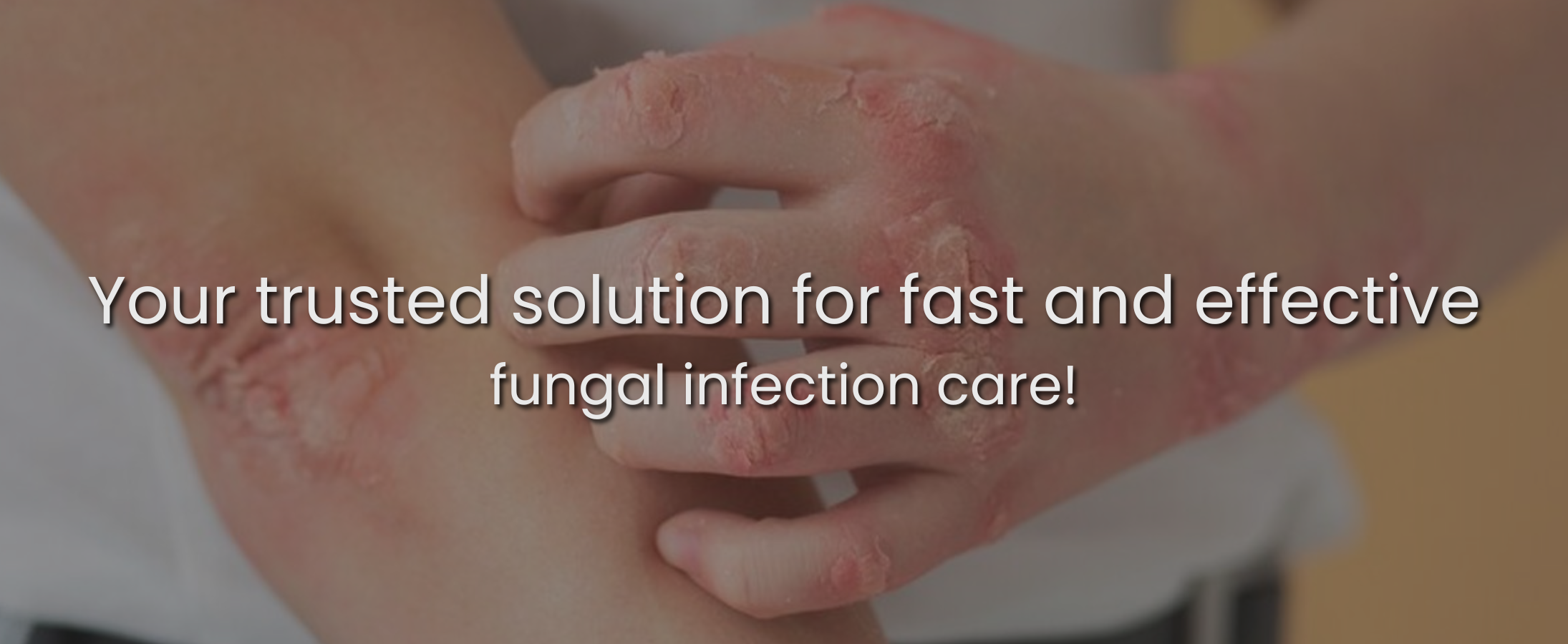
Comprehensive Fungal Infection Treatment at Satya Skin & Hair Solutions
Among all the skin disorders the most often common skin problems affecting individuals of all ages are fungal infection. Various kinds of fungus produce these infections, which can affect any part of the body—including the skin, scalp, nails, and even internal organs. Led by eminent physicians Dr. Ruchi Agarwal and Dr. Shaiil Gupta, Satya Skin & Hair Solutions offers modern fungal infection treatment in Gurugram and Delhi NCR catered to every patient’s particular requirements.
Our clinic strives to deliver long-term treatment and healthy skin by providing efficient solutions for a variety of fungal diseases situated in both Delhi and Gurugram. At first, fungal infection seem innocuous, but unchecked they can cause more major problems. For a correct diagnosis and Fungal Infection treatment in Gurugram and Delhi NCR, then, competent medical attention is absolutely vital.
What Is a Fungal Infection?
When fungi—such as yeast and molds—which thrive in warm, damp surroundings penetrate the skin or nails, they cause fungal diseases. Usually found on the surface of the skin, these species can cause infections when environmental factors support their proliferation or damage the body’s immune system. Among the most often occurring forms of fungal infections are some:
- Athlete’s foot (Tinea pedis): This infection commonly affects the feet, most especially between the toes causing itching, burning, and peeling skin.
- Usually affecting the feet, the athlete’s foot (Tinea pedis) most especially between the toes causes itching, burning, and peeling skin.
- Ringworm (Tinea corporis): Despite its name, ringworm is a fungal infection that appears as red, circular lesions on the skin.
- Candidiasis (Yeast infections): Often found in places prone to moisture like the groin, under the breasts, or underarms, candidiasis—also known as yeast infections—causes redness, itching, and pain.
Symptoms of Fungal Infections
The affected area will determine how a fungal infection shows itself. Typical symptoms consist of:
- Itching and Redness: A persistent itch, often accompanied by redness, is a primary symptom of fungal infections.
- Peeling or Cracking Skin: Areas like the hands or feet could show peeling or cracking of skin, particularly between the fingers or toes.
- Rashes: Some fungal infections, including ringworm, produce red, inflammatory rashes reminiscent of rings.
- Thickened or Discolored Nails: Fungal nail infections could result in brittle, thick, or discolored nails.
If you have any of these symptoms, you must see a seasoned dermatologist for a correct diagnosis and quick treatment. For quick and efficient healing, at Satya Skin & Hair Solutions we provide specific fungal infection treatment in Delhi and Gurugram.

Meet with our board certified doctors to diagnose your hair loss and discuss treatments. Schedule A Physician Consult

Explore our insightful blogs on hair loss transplant today! Read Blogs
Results that inspire and Transform photos of our
patients. Explore Galleries
Fungal Infection Treatment at Satya Skin & Hair Solutions
We at Satya Skin & Hair Solutions approach treating fungal diseases holistically. Our treatments are catered to the degree of the infection, the kind of fungus involved, and the general state of the patient. Renowned for their skill in precisely and carefully treating fungal diseases, our dermatologists, Dr. Ruchi Agarwal and Dr. Shaiil Gupta
- Topical Antifungal Medications: Commonly used for mild to moderate fungal infections are topical antifungal remedies. Applied directly to the afflicted area, antifungal creams, lotions, or ointments help to eradicate the fungal development.
- Oral Antifungal Medications: Oral antifungal modules may be advised for more severe or extensive infections. These medications fight the fungus from within the body, therefore stopping its spread.
- Lifestyle and Hygiene Advice: Along with medical therapy, we provide patients advice on keeping appropriate cleanliness and lifestyle changes to stop the fungal infection recurrence. This covers tips on avoiding tight clothes, keeping impacted areas dry, and applying antifungal powders or sprays.
Modern diagnostic instruments in our Delhi and Gurugram clinics help us to determine the kind of fungus causing the infection precisely. This guarantees that, considering their particular demands, patients get the most efficient treatment.

Fungal Infection Treatment Cost in Gurugram and Delhi NCR
The degree of the infection, the type of treatment needed, and the length of the treatment all affect the cost of fungal infection treatment in Gurugram and Delhi NCR at Satya Skin & Hair Solutions. While severe instances requiring oral pills or longer care may entail additional expenses, mild infections that just call for topical treatments are usually more reasonably priced.Our dermatologists will thoroughly evaluate your disease and go over the most efficient treatment choices together with the related expenses at your first visit.
Conclusion
Although fungal infections can be unpleasant and recurring, with the correct treatment you will find relief and restore the health of your skin. Our knowledgeable dermatologists, Dr. Ruchi Agarwal and Dr. Shaiil Gupta of Satya Skin & Hair Solutions are committed to providing efficient, customized fungal infection treatment in Gurugram and Delhi NCR. For every one of our patients, our thorough approach and cutting-edge medical solutions guarantee long-lasting effects and better skin conditions.Contact Satya Skin & Hair Solutions right now to schedule your consultation and begin your road towards healthy, fungus-free skin!
Results
Frequently Asked Questions
Correct therapy is necessary to eradicate a fungal infection. Based on the degree, one can use oral antifungal drugs, topical antifungal creams, or both combined. Key actions are maintaining the afflicted area dry and clean, exercising excellent hygiene, and applying over-the-counter or prescribed therapies. See a dermatologist to decide what to do about ongoing infections.
Overgrowth of organisms like yeasts or molds causes fungal infections. These fungi flourish in warm, moist places of the body including the feet (athlete’s foot), scalp, nails, and intimate areas. Common fungal infections include itching, rashes, and pain; they include athlete’s foot, yeast infections, and ringworm.
Yes, the correct therapy will help to heal fungal infections. Prescription antifungal creams, lotions, or oral drugs depend on the kind and degree of the infection. Recurrence can be avoided by keeping good hygiene and following therapy advice.
Consistent treatment with antifungal creams or oral medicine advised by a specialist is crucial if one wants to permanently eradicate a fungal infection in the private areas. Maintaining good hygiene, using loose-fitting cotton underwear, and keeping the area dry also helps to avoid further infections. A dermatologist should be seen for a long-term treatment plan for reoccurring occurrences.
Usually affecting the skin between the toes and occasionally the soles, a fungal infection on the feet is also known as athlete’s foot (tinea pedis). Fungi that flourish in moist, warm surroundings—like those of shoes and socks—cause it. Redness, itching, peeling skin, and occasionally blisters define symptoms.
Although most fungal infections are not fatal, if left untreated, especially in those with compromised immune systems, they can become rather dangerous. Untreated fungal infections could travel to other areas of the body and produce problems or discomfort. Early treatment is advised to prevent any major problems.
The prescription and brand of antifungal tablets determine their cost. Depending on the dosage and prescription, antifungal medicines like Fluconazole or Itraconazole can normally cost anywhere from INR 100 to INR 500 for each tablet in India. Treatment length will determine the overall cost.
With appropriate treatment and preventive actions, fungal infections can indeed be permanently cured. While topical and oral antifungal medicines can eradicate the infection, preventing recurrence depends mostly on maintaining good hygiene, keeping the skin dry, and following the doctor’s advice.
Yes, with suitable treatment, fungal infections can be eliminated. Early diagnosis and the correct mix of topical or oral antifungal drugs will eradicate the infection rather quickly. Still, maintaining good hygienic standards helps prevent reinfection.
Yes, several fungal illnesses like yeast infections, ringworm, and athlete’s foot can be communicative. Direct skin contact with an infected individual, sharing of personal goods, or contact with contaminated surfaces can all help them be transmitted.
- The type and degree of the infection affect the recovery duration. With suitable treatment, mild cases may resolve within a few days to several weeks; severe or recurrent infections may take many weeks or even months for total recovery.
Reducing sugar and refined carbs can help control fungal infections since Candida and other fungi feed on sugar. Limiting processed meals, alcohol, and items containing yeast may also help in recuperation.
Although stress by itself may not directly lead to fungal infections, it can impair the immune system, increasing a person’s vulnerability to diseases including those brought on by fungus.
Yes, proper hygiene, dry skin, breathable clothes, avoiding sharing personal goods, and cleaning surfaces that can support fungus constitute part of preventative actions.
Untreated fungal infections can aggravate, spread to other parts of the body, result in secondary infections, and in rare circumstances cause more major medical problems. Avoiding these hazards requires timely treatment.
Yes, if one does not practice good hygiene or avoid contact with the same fungal sources, fungal illnesses can return. Consistent follow-ups and commitment to treatment regimens help to lower the likelihood of recurrence.
Yes, hormonal changes influencing pH balance might cause pregnant women to be more prone to yeast infections. See a healthcare professional for safe and efficient treatment alternatives during pregnancy.
Yes, fungal infections can affect nails, resulting in onychomycosis—a disorder marked by either thickened, brittle, or discolored nails. Usually, treatment consists of oral drugs, topical antifungal treatments, or laser therapy.
Reduced distractions, more warmth, or moisture when sleeping might all help to explain why fungal infections may produce more obvious itching at night.
Cotton and other loose-fitting, breathable materials assist in lowering moisture levels and ward against fungal growth. Steer clear of tight clothes that accentuate heat and trap sweat.
While bacterial infections can result in localized discomfort, swelling, and pus development, fungal infections often bring redness, itching, and scaling. A dermatologist’s diagnosis guarantees the right course of action.
Some fungi are more difficult to cure since some can acquire resistance to antifungal medications. This underlines the need for accurate diagnosis, focused treatment, and following of treatment guidelines.
Rarely, particularly in immunocompromised people, fungal infections can spread internally and turn systemic. Prevention of problems depends on quick treatment.
Take Our Quick
Skin Treatment Quiz
Find out the best Product & Treatment
for your skin type today

